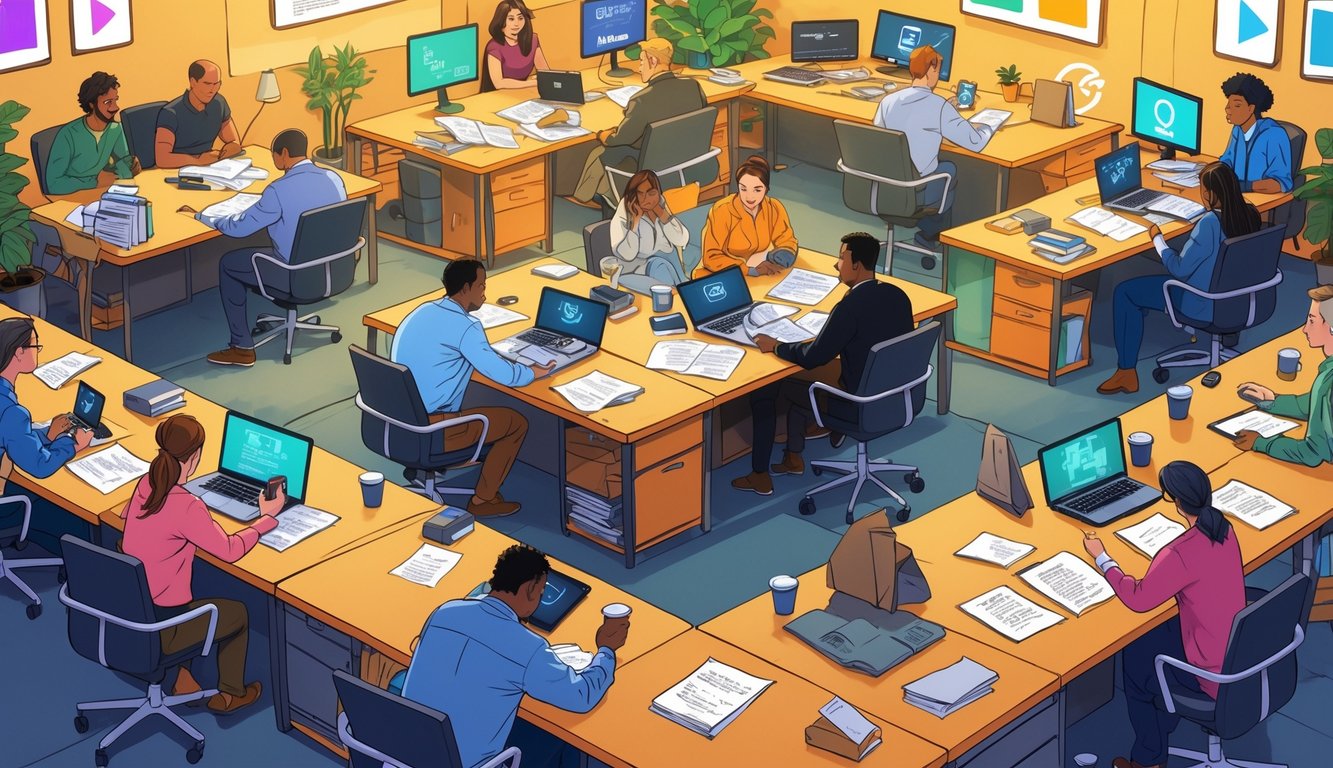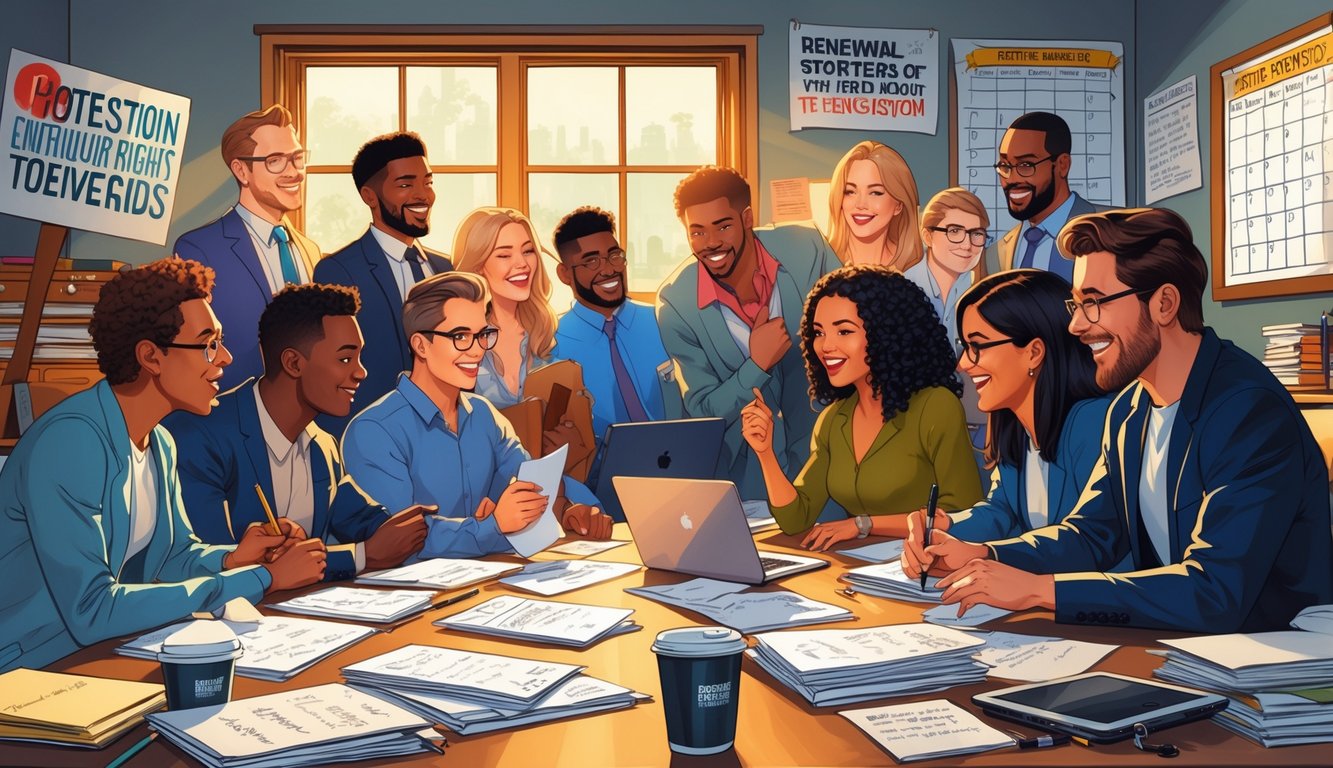
Evolving Models: Mini-Rooms and Streaming Platforms

Didn’t sleep—again—because mini-rooms won’t stop rattling around in my head. TV renewal odds? Totally different now. Mini-rooms are everywhere, streaming platforms are tossing out 8-episode orders like they’re free, and the whole industry’s just… off.
How Mini-Rooms Shape Development
Mini-room life: by day three, you’re making up jokes just to stay awake, but mostly you’re drowning in work. One showrunner at a union thing grumbled (and, yeah, he’s right): “We’re writing whole seasons with three people and cold takeout.” Networks love it—cheaper, faster, fewer writers (VPM). Creative incubator? Or just burnout central?
Nobody talks about how mini-rooms basically block junior writers from even talking, let alone getting promoted. That old “staff writer to showrunner” pipeline? Gone. And when a network renews something, but the episodes were written by, like, three people, the worldbuilding’s flat. I watched a streaming reboot tank after one season—nobody knew the side characters’ backstories. Blame the mini-room and overloaded notepads.
Impact of Streaming Platforms on Renewals
The real shakeup? Streaming. Forget old-school TV. Netflix, Hulu, whatever—nobody’s promising you more than a few episodes. “Data-driven renewals” rule now. I heard an exec at a summit say, “Shows get two months, then we cut them.” Brutal. Nobody knows the numbers; all that matters is subscribers and some spreadsheet.
Saw three friends’ shows get greenlit for eight episodes, barely any rewrites, then just—poof—canceled before anyone could even pitch a second season. Streaming platforms never share viewership, so you’re stuck guessing with Rotten Tomatoes and Twitter buzz (SlashFilm). Renewal odds? Might as well buy a lottery ticket.
Oh, and have you noticed how streaming shows disappear way faster than old network flops? No reruns, no warning, just off the platform. I’ve started a spreadsheet to keep track. Closure? Forget it.
The Role of Labor and Advocacy

Skipped lunch again—because apparently, “writers’ room” means jokes and spellcheck, not actual labor. People forget the Writers Guild contract is the only reason any of us have, like, a safety net. Nobody cares until a spec script gets yanked or staffing freezes mid-pilot because, shocker, people have rent and want a life.
The Importance of the Writers Guild of America
Lost count of how many times I’ve heard WGA is both shield and sledgehammer. Remember the 2007-08 strike? TV turned into reruns and reality garbage so fast I thought pilot season was a myth. Producers go from cheerful to panicked the second union reps show up. That’s when you get it: WGA isn’t just a logo, it’s the only thing stopping staff writers from eating bagels for dinner forever.
Sometimes it takes a walkout or a loud tweet to get a streaming order bumped up. The Fight Like Hell crowd—writing scripts and angry op-eds—wants the WGA to be more than contracts. Getting fired for speaking up about hours or content? Not just a plotline, it’s a daily “will my badge work tomorrow?” mood. Still got the “WGA minimums” PDF on my phone. Comfort is a joke after a network merger. If you think that’s dramatic, research says newsroom unionism actually changes things.
Living Wage and Labor Rights
Three seasons in, budgets balloon, but who’s still counting script revisions as billable hours? Not the execs. Living wage? Means nothing when the PA’s running two coffee errands and getting paid for none. Met a story editor who literally mapped out how long she could survive after her first staff renewal—down to the week.
Nobody likes talking about cable residuals—sometimes that ancient syndication deal is the only thing keeping you afloat after a room shuts down. And all these headlines about labor organizing? Mainstream histories totally miss the point. It’s little stuff: comp time, bathroom breaks, knowing your contract actually means something. Lose those, and you’re toast unless someone’s bugging payroll for transparency. Not being negative, just honest. That’s survival—one draft, one weird WGA check-in at a time.
Executive Oversight and Decision Making
I’ve watched showrunners and execs fight over coffee orders like it’s a power move. Power dynamics here are wild. Co-EP says “no more flashbacks,” but the loudest person in the room gets credit—and never the blame when the show tanks. Still can’t remember which producer loves all-nighter rewrites.
Showrunners vs. Producers: Who Has the Final Say?
Some days, I wonder if the showrunner’s even in charge or just pretending. Saw an EP literally whisper into a script about “international appeal.” Makes sense? Maybe. The showrunner’s supposed to have the plan, hire people, sign off on big stuff. Try telling that to a producer who’s besties with the network boss.
Watched a co-EP kill a plotline because his niece “didn’t get it.” That’s real. Decision charts? Nobody reads those (see more on executive team chaos). The executive producer moves money, claims creative credit, then blames the showrunner if the episode flops. Who’s actually in charge? Whoever yells loudest or sends more emails before lunch.
Legal says contracts are clear. They aren’t. Sometimes the assistant with the snack order has more power than the whole producer panel—if they’ve got the right gossip about renewals.
Network Executives and Renewal Choices
Look, I wish I could say it’s all about “creative merit” when shows get renewed, but that’s just not how it works. There’s this whole crowd of network execs—never just one, despite what people think—sitting around in endless meetings, tossing numbers, demos, ad budgets, and some “cross-functional expertise” (which, let’s be honest, usually means a Harvard MBA who’s never watched the show) into the pile. If you want to read about how much they overthink this, here’s PwC’s take. I once watched a renewal get axed because some rival hated the lead’s scarf. Seriously, a scarf. I’m not making this up.
They drag in ad sales, legal, “strategic oversight” types—half the time, nobody even knows who’s supposed to answer for tanking Thursday numbers, but everyone blames the costume budget anyway. “Mechanisms” gets thrown around, which just means more red tape and less attention for the people actually making the show.
So do six Nielsen points matter, or is it just what the execs had for lunch? I honestly think it’s the latter half the time. And don’t even start me on the exec producer who only cares about product placement. The soda cans—always so awkward, always there.



